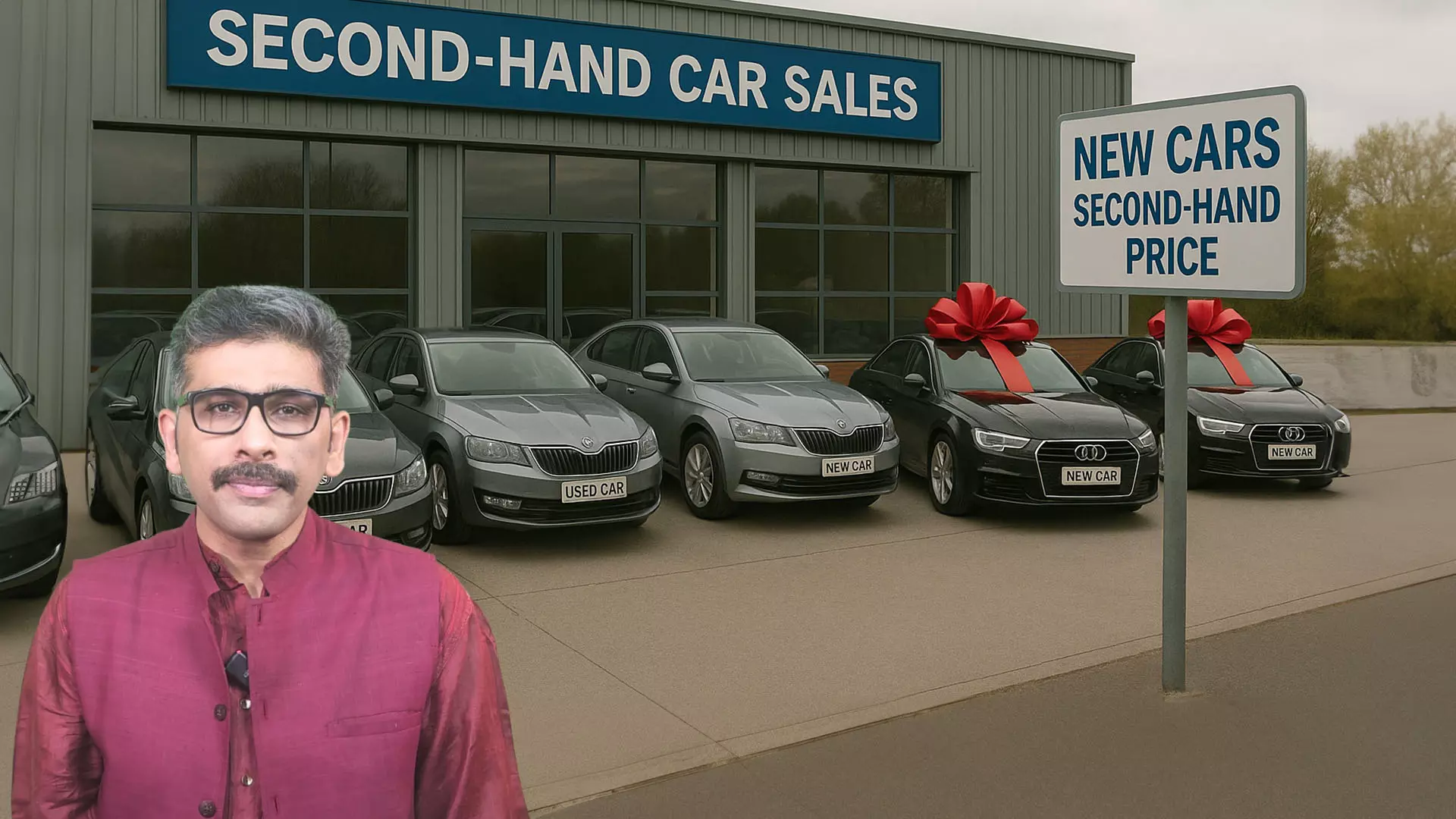
Unregistered cars sold as new? The truth behind showroom discounts
Second-hand dealers are selling brand-new, unregistered cars at massive discounts. Is this practice legal, ethical, worth your money? Is it a smart buy or a scam?

Brand new cars in second-hand markets?
In a surprising twist, several automobile YouTubers and dealers are showcasing brand-new, unregistered cars in the second-hand market—offering discounts of up to ₹5 lakh on cars that have barely left the factory. These cars come with a tempting promise: you’ll be their first registered owner. But how is this possible? And is it legal?
The Federal investigates this murky but growing trend, which is reshaping India’s second-hand car market.
Secret deals between dealers
YouTuber Gaurav Sethi recently posted a video featuring Maruti Suzuki cars—yes, the company with a 40% market share in India—being sold at throwaway prices by second-hand dealers. The dealer claimed to have purchased “remaining stock” directly from showrooms.
Automobile journalist Amit Khare, known as "Car Guru," sheds light on this arrangement. According to him, new car dealers and used car dealers sometimes strike under-the-table deals to offload unsold inventory, especially when showroom sales slow down.
“There is a secret understanding among a car dealer and a used car market dealer to push these models on an extra discount,” said Amit Khare.
Why dealers do this
This practice helps inflate monthly sales figures for original car dealerships. In fact, manufacturers like Suzuki, Honda, Mahindra, and Tata—represented by the Society of Indian Automobile Manufacturers (SIAM)—ask their dealers to maintain a buffer of 21 days of inventory. However, in some instances, this has gone up to 70 days, causing financial strain on dealers.
To cope, some dealers sell unregistered cars at a discount to second-hand dealers, who then sell them to customers. This benefits all parties—on paper. The customer saves money, the showroom meets sales targets, and the used car dealer gets a hot-selling product.
The legality question
Surprisingly, this practice is legal.
Even though the car may have changed hands between dealers, registration is what makes you the legal first owner. It’s only when you register the vehicle with your local RTO (e.g., TN for Tamil Nadu, DL for Delhi) that ownership is officially counted.
A car sold and a car registered are two totally different things. This is the loophole dealers are using. Still, buyers should be cautious—get the vehicle thoroughly inspected by your own mechanic and ensure warranty and service entitlements are intact.
Why not offer discounts in showrooms?
Car companies prefer to maintain a clean brand image and ethical pricing policies. Many hire auditing firms to ensure dealerships aren’t offering massive showroom discounts, which could hurt brand perception.
So instead of officially reducing showroom prices, they bulk-sell to used car dealers at special rates, effectively bypassing audit checks and brand scrutiny.
Who’s the first owner?
You are. In India, unless a vehicle is registered, it hasn’t had an official owner. So even if your “new” car went from dealer A to dealer B, you’re the first one to register it, making you the official first owner.
This loophole helps maintain showroom price integrity while also making use of unsold inventory.
Is this fair to full-price buyers?
Consider this: Sudhakaran buys a car for ₹20 lakh from a showroom. Two weeks later, his friend Ravindran buys the same car from a used car lot for ₹15 lakh.
Was this a fair situation for Sudhakaran?
Such pricing discrepancies erode trust. It's not just about money; it’s about fairness and transparency.
The Nissan X-Trail case
Amit Khare shared a striking example involving the Nissan X-Trail. Originally launched at ₹49.5 lakh, the car failed to sell due to overpricing. Only 10–15 units were sold initially. The unsold stock was then sold to Big Boy Toyz—a luxury used-car dealership—which offered the same car for just ₹20.5 lakh.
“Customers who bought the X-Trail at full price saw it sold a month later at over 50% discount in their own neighborhood,” Khare recounted.
Such moves damage brand credibility and infuriate early buyers who paid a premium.
What does this say about the economy?
Beyond the auto sector, this trend raises questions about India’s broader economy.
Are car prices simply too high for the average consumer? Or is declining demand a sign of deeper economic strain? These are tough but important questions as carmakers, dealers, and buyers all look for ways to adapt.
The content above has been transcribed from video using a fine-tuned AI model. To ensure accuracy, quality, and editorial integrity, we employ a Human-In-The-Loop (HITL) process. While AI assists in creating the initial draft, our experienced editorial team carefully reviews, edits, and refines the content before publication. At The Federal, we combine the efficiency of AI with the expertise of human editors to deliver reliable and insightful journalism.

